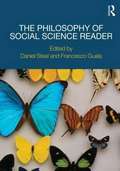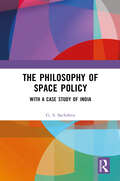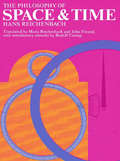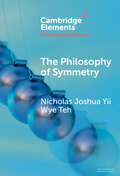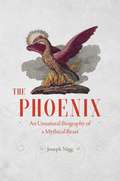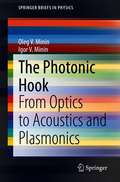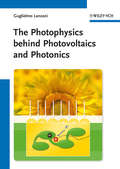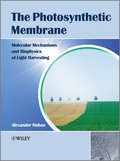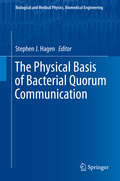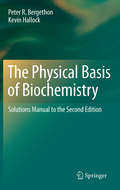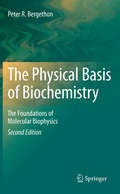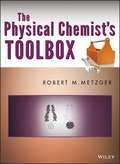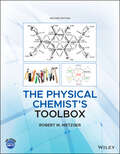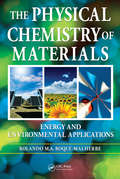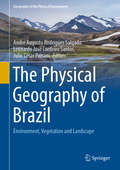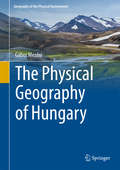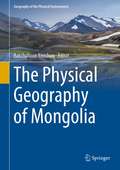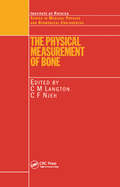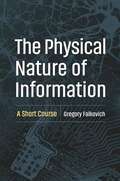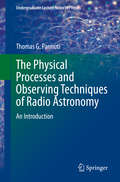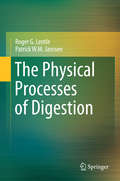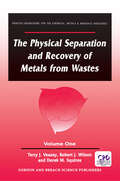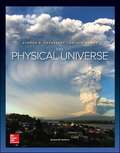- Table View
- List View
The Philosophy of Social Science Reader
by Francesco Guala Daniel SteelThe Philosophy of Social Science Reader is an outstanding, comprehensive and up-to-date collection of key readings in the philosophy of social science, covering the essential issues, problems and debates in this important interdisciplinary area. Each section is carefully introduced by the editors, and the readings placed in context. The anthology is organized into seven clear parts: Values and Social Science Causal Inference and Explanation Interpretation Rationality and Choice Individualism Norms Cultural Evolution. Featuring the work of influential philosophers and social scientists such as Ernest Nagel, Ian Hacking, John Searle, Clifford Geertz, Daniel Kahneman, Steven Lukes and Richard Dawkins, The Philosophy of Social Science Reader is the ideal text for philosophy of social science courses, and for students in related disciplines interested in the differences between the social and natural sciences.
The Philosophy of Space Policy: With a Case Study of India
by G. S. SachdevaSpace activities by governmental agencies require considerable state funding and bear long gestation periods with uncertainty in results. This necessitates the development of a directional policy defining long-term goals, embodying national aspirations, and envisaging techno-possibilities for manufacturing and operations. This book offers hints for such policy-making and also explores other alternatives to enable clarity for internal constituency and international posturingThe first section of this work discusses philosophical perspectives, namely – theoretical, theological, ethical and auditorial. The second section offers options and initiatives as alternatives or adjuncts to space policy. The subject matter in this book also includes a case study of India. It narrates a brief history of national space activities and the journey of Indian Space Research Organisation (ISRO), besides providing a futuristic vision for India and its global stance.Print edition not for sale in South Asia (India, Sri Lanka, Nepal, Bangladesh, Pakistan and Bhutan)
The Philosophy of Space and Time
by Hans ReichenbachAn important landmark in the development of the empiricist conception of geometry, this book is still one of the clearest and most valuable expositions of the crisis in physical science and mathematics occasioned by the advent of the non-Euclidean geometries. With unusual depth and clarity, it covers the problem of the foundations of geometry, the theory of time, the theory and consequences of Einstein's relativity including: relations between theory and observations, coordinate definitions, relations between topological and metrical properties of space, the psychological problem of the possibility of a visual intuition of non-Euclidean structures, and many other important topics in modern science and philosophy.While some of the book utilizes mathematics of a somewhat advanced nature, the exposition is so careful and complete that most people familiar with the philosophy of science or some intermediate mathematics will understand the majority of the ideas and problems discussed.Partial CONTENTS: I. The Problem of Physical Geometry. Universal and Differential Forces. Visualization of Geometries. Spaces with non-Euclidean Topological Properties. Geometry as a Theory of Relations. II. The Difference between Space and Time. Simultaneity. Time Order. Unreal Sequences. Ill. The Problem of a Combined Theory of Space and Time. Construction of the Space-Time Metric. Lorentz and Einstein Contractions. Addition Theorem of Velocities. Principle of Equivalence. Einstein's Concept of the Problems of Rotation and Gravitation. Gravitation and Geometry. Riemannian Spaces. The Singular Nature of Time. Spatial Dimensions. Reality of Space and Time.
The Philosophy of Symmetry (Elements in the Philosophy of Physics)
by Nicholas Joshua Yii Wye TehThis Element is a concise, high-level introduction to the philosophy of physical symmetry. It begins with the notion of 'physical representation' (the kind of empirical representation of nature that we effect in doing physics), and then lays out the historically and conceptually central case of physical symmetry that frequently falls under the rubric of 'the Relativity Principle,' or 'Galileo's Ship.' This material is then used as a point of departure to explore the key hermeneutic challenge concerning physical symmetry in the past century, namely understanding the physical significance of the notion of 'local' gauge symmetry. The approach taken stresses both the continuity with historically important themes such as the Relativity Principle, as well as novel insights earned by working with contemporary representational media such as the covariant phase space formalism.
The Phoenix: An Unnatural Biography of a Mythical Beast
by Joseph NiggArising triumphantly from the ashes of its predecessor, the phoenix has been an enduring symbol of resilience and renewal for thousands of years. But how did this mythical bird become so famous that it has played a part in cultures around the world and throughout human history? How much of its story do we actually know? Here to offer a comprehensive biography and engaging (un)natural history of the phoenix is Joseph Nigg, esteemed expert on mythical creatures--from griffins and dragons to sea monsters. Beginning in ancient Egypt and traveling around the globe and through the centuries, Nigg's vast and sweeping narrative takes readers on a brilliant tour of the cross-cultural lore of this famous, yet little-known, immortal bird. Seeking both the similarities and the differences in the phoenix's many myths and representations, Nigg describes its countless permutations over millennia, including legends of the Chinese "phoenix," which was considered one of the sacred creatures that presided over China's destiny; classical Greece and Rome, where it can be found in the writings of Herodotus and Ovid; nascent and medieval Christianity, in which it came to embody the resurrection; and in Europe during the Renaissance, when it was a popular emblem of royals. Nigg examines the various phoenix traditions, the beliefs and tales associated with them, their symbolic and metaphoric use, the skepticism and speculation they've raised, and their appearance in religion, bestiaries, and even contemporary popular culture, in which the ageless bird of renewal is employed as a mascot and logo, including for our own University of Chicago. Never bested by hardship or defeated by death, the phoenix is the ultimate icon of hope and rebirth. And in The Phoenix: An Unnatural Biography of a Mythical Beast, it finally has its due--a complete chronicle worthy of such a fantastic and phantasmal creature. This entertaining and informative look at the life and transformation of the phoenix will be the authoritative source for anyone fascinated by folklore and mythology, re-igniting our curiosity about one of myth's greatest beasts.
The Photographic Atlas of the Stars
by H J Arnold P Doherty P MooreThe Photographic Atlas of the Stars contains 50, high-quality full color photographs of the entire night sky of the northern and southern hemispheres. Each plate is accompanied by a star map of the identical area, which identifies the main stars of the constituent constellations as well as other interesting astronomical objects. In addition to this detail, Sir Patrick Moore has written a commentary for each plate that highlights the stars and objects of interest to observers equipped with binoculars and that includes detailed tabular information on astronomical objects of the region. The resulting double-page spread provides an invaluable reference for the amateur astronomer, detailing the constellations and other heavenly bodies of interest that are observable with the naked eye, binoculars, or a small telescope.
The Photonic Hook: From Optics to Acoustics and Plasmonics (SpringerBriefs in Physics)
by Oleg V. Minin Igor V. MininThis book describes the recently-discovered artificially curved light beam known as the photonic hook. Self-bending of light, a long-time goal of optical scientists, was realized in 2007 with the Airy beam, followed by the first demonstration of the photonic hook by the authors of this book and their collaborators in 2015 and experimentally in 2019. The photonic hook has curvature less than the wavelength, along with other unique features described in this book that are not shared by Airy-like beams, and so deepens our understanding of light propagation. This book discusses the general principles of artificial near-field structured curved light and the full-wave simulations of the photonic hook along with their experimental confirmation. The book goes on to show how the photonic hook has implications for acoustic and surface plasmon waves and as well as applications in nanoparticle manipulation.
The Photophysics behind Photovoltaics and Photonics
by Guglielmo LanzaniFrom a leading researcher in optical spectroscopy and electronic properties of novel semiconductors comes this much-needed toolbox title to understand the concepts behind the spectroscopy of advanced organic materials and how they work.The book thus provides basic and practical knowledge on material photophysics for planning, carrying out and understanding experiments in spectroscopy. It contains a collection of simple practical rules for data analysis and interpretation, together with a list of experimental techniques, including the latest methods. Each topic is complemented by examples taken from forefront research on nanomaterials, photovoltaics and photonics, and each chapter includes a discussion, examples, topical boxes, tables and figures. The whole is rounded off by a bibliography for further reading, major references and appendixes containing theoretical derivation and numerical code.The result is a quick guide for the spectroscopist who needs to grasp the concept of the experiments.
The Photosynthetic Membrane
by Alexander V. RubanThe proteins that gather light for plant photosynthesis are embedded within cell membranes in a site called the thylakoid membrane (or the "photosynthetic membrane"). These proteins form the light harvesting antenna that feeds with energy a number of vital photosynthetic processes such as water oxidation and oxygen evolution, the pumping of protons across the thylakoid membranes coupled with the electron transport chain of the photosystems and cytochrome b6f complex, and ATP synthesis by ATP synthase utilizing the generated proton gradient. The Photosynthetic Membrane: Molecular Mechanisms and Biophysics of Light Harvesting is an introduction to the fundamental design and function of the light harvesting photosynthetic membrane, one of the most common and most important structures of life. It describes the underlying structure of the membrane, the variety and roles of the membrane proteins, the atomic structures of light harvesting complexes and their macromolecular assemblies, the molecular mechanisms and dynamics of light harvesting and primary energy transformations, and the broad range of adaptations to different light environments. The book shows, using the example of the photosynthetic membrane, how complex biological structures utilize principles of chemistry and physics in order to carry out biological functions. The Photosynthetic Membrane: Molecular Mechanisms of Light Harvesting will appeal to a wide audience of undergraduate and postgraduate students as well as researchers working in the fields of biochemistry, molecular biology, biophysics, plant science and bioengineering.
The Phylogenetic Handbook: A Practical Approach to Phylogenetic Analysis and Hypothesis Testing
by Philippe Lemey Marco Salemi Anne-Mieke VandammeThe Phylogenetic Handbook is a broad, hands on guide to theory and practice of nucleotide and protein phylogenetic analysis. This second edition includes six new chapters, covering topics such as Bayesian inference, tree topology testing and the impact of recombination on phylogenies, as well as a detailed section on molecular adaptation. The book has a stronger focus on hypothesis testing than the previous edition, with more extensive discussions on recombination analysis, detecting molecular adaptation and genealogy-based population genetics. Many chapters include elaborate practical sections, which have been updated to introduce the reader to the most recent versions of sequence analysis and phylogeny software, including BLAST, FastA, Clustal, T-coffee, Muscle, DAMBE, Tree-puzzle, Phylip, MEGA, PAUP*, IQPNNI, CONSEL, ModelTest, Prottest, PAML, HYPHY, MrBayes, BEAST, LAMARC, SplitsTree, and RDP. Many analysis tools are described by their original authors, resulting in clear explanations that constitute an ideal teaching guide for advanced-level undergraduate and graduate students.
The Physical Basis of Bacterial Quorum Communication
by Stephen J. HagenQuorum sensing (QS) describes a chemical communication behavior that is nearly universal among bacteria. Individual cells release a diffusible small molecule (an autoinducer) into their environment. A high concentration of this autoinducer serves as a signal of high population density, triggering new patterns of gene expression throughout the population. However QS is often much more complex than this simple census-taking behavior. Many QS bacteria produce and detect multiple autoinducers, which generate quorum signal cross talk with each other and with other bacterial species. QS gene regulatory networks respond to a range of physiological and environmental inputs in addition to autoinducer signals. While a host of individual QS systems have been characterized in great molecular and chemical detail, quorum communication raises many fundamental quantitative problems which are increasingly attracting the attention of physical scientists and mathematicians. Key questions include: What kinds of information can a bacterium gather about its environment through QS? What physical principles ultimately constrain the efficacy of diffusion-based communication? How do QS regulatory networks maximize information throughput while minimizing undesirable noise and cross talk? How does QS function in complex, spatially structured environments such as biofilms? Previous books and reviews have focused on the microbiology and biochemistry of QS. With contributions by leading scientists and mathematicians working in the field of physical biology, this volume examines the interplay of diffusion and signaling, collective and coupled dynamics of gene regulation, and spatiotemporal QS phenomena. Chapters will describe experimental studies of QS in natural and engineered or microfabricated bacterial environments, as well as modeling of QS on length scales spanning from the molecular to macroscopic. The book aims to educate physical scientists and quantitative-oriented biologists on the application of physics-based experiment and analysis, together with appropriate modeling, in the understanding and interpretation of the pervasive phenomenon of microbial quorum communication.
The Physical Basis of Biochemistry
by Peter R. Bergethon Kevin Hallockadvanced undergraduate/beginning graduate level students and would be applied to courses focusing on three different areas: Foundations of molecular biophysics Macromolecular structure and assembly Methods in physical biochemistry
The Physical Basis of Biochemistry
by Peter R. BergethonBiological chemistry has changed since the completion of the human genome project. There is a renewed interest and market for individuals trained in biophysical chemistry and molecular biophysics. The Physical Basis of Biochemistry, Second Edition, emphasizes the interdisciplinary nature of biophysical chemistry by incorporating the quantitative perspective of the physical sciences without sacrificing the complexity and diversity of the biological systems, applies physical and chemical principles to the understanding of the biology of cells and explores the explosive developments in the area of genomics, and in turn, proteomics, bioinformatics, and computational and visualization technologies that have occurred in the past seven years. The book features problem sets and examples, clear illustrations, and extensive appendixes that provide additional information on related topics in mathematics, physics and chemistry.
The Physical Chemist's Toolbox
by Robert M. MetzgerThe working tools of the physical sciences, expertly organized into one volume Covering the basic concepts and working tools in the physical sciences, this reference is a unique, indispensable guide for students and researchers in chemistry, physics, and related disciplines. Everyone from novices to experienced researchers can turn to this book to find the essential equations, theories, and working tools needed to conduct and interpret contemporary research. Expertly organized, the book. Summarizes the core theories common to chemistry and physics Introduces topics and techniques that lay the foundations of instrumentation Discusses basic as well as advanced instrumentation and experimental methods Guides readers from crystals to nanoparticles to single molecules Readers gain access to not only the core concepts of the physical sciences, but also the underlying mathematics. Among the topics addressed are mechanics, special relativity, electricity and magnetism, quantum chemistry, thermodynamics, electrochemistry, symmetry, solid state physics, and electronics. The book also addresses energy and electrical sources, detectors, and algorithms. Moreover, it presents state-of-the-technology instrumentation and techniques needed to conduct successful experiments. Each chapter includes problems and exercises ranging from easy to difficult to help readers master core concepts and put them into practice. References lead to more specialized texts so that readers can explore individual topics in greater depth. The Physical Chemist's Toolbox is recommended not only as a general reference, but also as a textbook for two-semester graduate courses in physical and analytical chemistry.
The Physical Chemist's Toolbox
by Robert M. MetzgerAssembling a great deal of material in one place, this book serves as a valuable guide for chemists and related physical scientists throughout their careers -- covering essential equations, theories, and tools needed for conducting and interpreting contemporary research. Offers a comprehensive and in-depth treatment of the most challenging concepts of chemistry Updates and revises existing chapters from the prior edition and adds: new chapters on inorganic, organic, and biochemistry; appendices about nuclides and organic reactions; and expanded questions at the end of chapters Has a complementary website with a solutions manual and PowerPoint presentations for instructors
The Physical Chemistry of Materials: Energy and Environmental Applications
by Rolando Roque-MalherbeIn recent years, the area dealing with the physical chemistry of materials has become an emerging discipline in materials science that emphasizes the study of materials for chemical, sustainable energy, and pollution abatement applications. Written by an active researcher in this field, Physical Chemistry of Materials: Energy and Environmental Appl
The Physical Geography of Brazil: Environment, Vegetation and Landscape (Geography of the Physical Environment Ser.)
by André Augusto Rodrigues Salgado Leonardo José Cordeiro Santos Julio César PaisaniThis book presents the Brazilian natural space and environment. It describes the main environmental aspects of Brazil in relation to geology, climate, geomorphology, vegetation, fauna, water resources and environmental issues. The book presents a beautifully illustrated overview of the physical geography of the Amazon Forest, the central Brazilian savannah (Cerrado), the Cocais Forest, the semi-arid area (Caatinga), the Atlantic Forest area, the Pantanal (Brazilian wetlands), the Auraucárias Plateau, the Pampas area (South grasslands) and the Brazilian Coastal Environment (beaches and mangroves).
The Physical Geography of Hungary
by Gábor MezősiThis book presents the most comprehensive and detailed overview of the physical environment of Hungary. The book makes a specific effort to connect regional geography with natural forcing and influencing factors. The first section discusses general characteristics relating to the physical geography of Hungary on a more theoretical basis including relief evolution, climate, hydrography, soils and vegetation. The second part focuses on regional content and analyzes conflicts, environmental values, threats and impacts of the different geographical units. This book appeals to researchers as well as students of physical geography and related disciplines and serves as a useful source for regional information on Hungary. This book can also be used as a field guide of the physical properties of this European country.
The Physical Geography of Mongolia (Geography of the Physical Environment)
by Batchuluun YembuuThis book gives the most detailed and comprehensive physico-geographical overview of the very unique country of Mongolia. The country offers diverse geographical features and natural landscapes combined with a long history. This book offers integrated and systematical research on the geophysical characteristics of Mongolia with an academic orientation. It provides the readers with general knowledge of the physical geography of Mongolia as well as new results of the latest research. The volume consists of 11 chapters, each written by field experts, with contributions from scientific researchers from Mongolia.The topics covered: geological and geomorphological characteristics and processes, landscapes and landforms, climate and climate change, hydrology, glaciers and permafrost, soils, environmental changes, biodiversity and many other aspects of physical geography in Mongolia.The book appeals to researchers and students of geography and related fields and can serve as a guide for field trips to Mongolia or basic literature for research projects.
The Physical Measurement of Bone
by C. M. Langton C. F. NjehBone is a complex biological material that consists of both an inorganic and organic phase, which undergoes continuous dynamic biological processes within the body. This complex structure and the need to acquire accurate data have resulted in a wide variety of methods applied in the physical analysis of bone in vivo and in vitro. Each method has it
The Physical Nature of Information: A Short Course
by Gregory FalkovichApplications of information theory span a broad range of disciplines today. This book presents a unified treatment of the subject for students and practitioners in the sciences. It teaches the tools universally used by physicists working on quantum computers and black holes, engineers designing self-driving cars, traders perfecting market strategies, chemists playing with molecules, biologists studying cells and living beings, linguists analyzing languages, and neuroscientists figuring out how the brain works. No matter what area of science you specialize in, The Physical Nature of Information unlocks the power of information theory to test the limits imposed by uncertainty. Provides a panoramic approach to information theory Draws on examples from physics, engineering, biology, economics, and linguistics Applications range from thermodynamics and statistical mechanics to dynamical chaos, information and communication theories, and quantum information Includes materials for lectures and tutorials along with exercises with detailed solutions Can be used to design a one-semester introductory course Ideal for self-study by graduate students and advanced undergraduates Invaluable for scholars seeking new research opportunities
The Physical Processes and Observing Techniques of Radio Astronomy: An Introduction (Undergraduate Lecture Notes in Physics)
by Thomas G. PannutiThis is a textbook for undergraduate courses on radio astronomy. Written by an active professor and researcher in the field, it begins by explaining why conducting observations at radio frequencies is so important, then reviews essential physics concepts corresponding to a sophomore-level curriculum or higher. Next, the book introduces students to single dish telescopes and interferometers. The most commonly encountered emission mechanisms seen in radio astronomy are then explained, along with examples of astronomical sources broadly divided into the types of sources seen in galactic and extragalactic observations. Each chapter provides examples and exercises suitable for homework assignments. Also included is an appendix of useful supplementary material. Altogether, the book is a comprehensive, yet digestible starting point for physics and astronomy undergraduates looking to understand the basics of radio astronomy.
The Physical Processes of Digestion
by Roger G. Lentle Patrick W.M. JanssenFood research (and funding) is becoming more and more focused on health. While researchers and product developers have made great strides in food engineering, there needs to be increased focus on what happens when the food is actually digested. How is the food absorbed? Do the benefits remain? Digestion is a complex topic, and this will be the first book aimed at food researchers. Authored by a physiologist and a food engineer, the book will be a welcome addition to the literature.
The Physical Separation and Recovery of Metals from Waste, Volume One
by Alan VeaseyThis book deals with the physical processes used for the separation of secondary metals from waste sources. The introduction briefly considers the history of the secondary metals industries, defines the terms used in materials recycling and discusses the potential for resource recovery and improved processing. A comprehensive survey is given of the
The Physical Universe
by Konrad B. Krauskopf Arthur BeiserThe Physical Universe, 16e by Konrad Krauskopf and Arthur Beiser is an outstanding text with a long history that has been updated and given a fresh look. This edition is also accompanied by a strong media component with the Connect online homework system and LearnSmart Smartbook. Aimed at presenting the essentials of physics, chemistry, earth science, and astronomy in a clear, easy-to-understand way, The Physical Universe shows students how science works, how scientists approach problems, and why science constantly evolves in its search for understanding.
